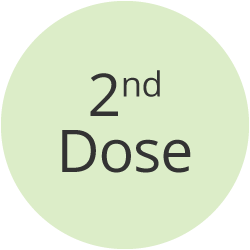Vaccine (Shot) for Chickenpox

Two doses of the chickenpox shot are recommended for children by doctors as the best way to protect against chickenpox (varicella).
When should my child get the chickenpox shot?
One dose at each of the following ages:
Older children or adolescents should also get two doses of the chickenpox vaccine if they have never had chickenpox or were never vaccinated. They should also get a second shot if they have had only one chickenpox shot.
Why should my child get the chickenpox shot?
Chickenpox is usually mild, but it can be serious in infants under 12 months of age, adolescents, adults, pregnant people, and people with a weakened immune system. Some people get so sick that they need to be hospitalized. It doesn’t happen often, but people can die from chickenpox. Most people who are vaccinated with 2 doses of varicella vaccine will be protected for life.
The chickenpox shot is safe.
The chickenpox shot is safe, and it is effective at protecting against chickenpox. Vaccines, like a medicine, can have side effects. These are usually mild and go away on their own.
What are the side effects?
Most children don’t have any side effects from the shot. The side effects that do occur are usually mild, and may include:
- Soreness, redness, or swelling where the shot was given
- Fever
- Mild rash
Prepare for your child's vaccine visit and learn about how you can:
- Research vaccines and ready your child before the visit
- Comfort your child during the appointment
- Care for your child after the shot
What is chickenpox?
Chickenpox is a disease that causes an itchy rash of blisters and a fever. A person with chickenpox may have as many as 500 blisters. The rash spreads over the whole body. Chickenpox can be serious, even life-threatening, especially in babies, adolescents, adults, people who are pregnant, and people with weakened immune systems.
What are the symptoms of chickenpox?
Chickenpox usually causes the following symptoms:
- An itchy rash of blisters
- Fever
- Headache
- Feeling tired
Symptoms usually last about a week. In some cases, chickenpox can cause serious problems.
Some people who have been vaccinated against chickenpox can still get the disease, called breakthrough chickenpox. However, they usually have milder symptoms with fewer or no blisters (or just red spots), a mild or no fever, and are sick for a shorter period of time than people who are not vaccinated.
Is chickenpox serious?
Chickenpox is usually mild in children, but the itching can be very uncomfortable. Children who get chickenpox can miss about a week of school or child care.
In some cases, chickenpox can cause serious problems, such as:
- Skin infections
- Dehydration (loss of body fluids)
- Pneumonia (an infection in the lungs)
- Encephalitis (swelling of the brain)
- Rarely, chickenpox may lead to death
Chickenpox can be serious
Complications from chickenpox can be serious and can occur in any person who develops chickenpox, although they are more common in healthy babies, adults, and people with weakened immune systems.
Before the vaccine was available, each year more than 4 million people got chickenpox, over 10,000 of those people were hospitalized, and up to 150 people died in the United States.
How does chickenpox spread?
Chickenpox spreads easily from people with chickenpox to others who have never had the disease or never been vaccinated. Chickenpox can also spread from people with shingles.
The disease spreads mainly through close contact with someone who has chickenpox or shingles. For example, it can spread when a person touches or breathes in the virus particles that come from the blisters when they get scratched.
Chickenpox can spread 1 to 2 days before the infected person gets a rash, and then doesn’t stop spreading until all the blisters have formed scabs. Vaccinated people who get chickenpox may develop lesions that do not form scabs. These people are considered contagious until no new lesions have appeared for 24 hours.
Chickenpox is very contagious. If one person has it, about 9 out of 10 people close to that person who are not protected against chickenpox will also become infected.
Why not let my child get chickenpox naturally?
Chickenpox is a mild disease for many children, but not all. There’s no way to know who will have a serious case. When your child gets the chickenpox shots, he or she is getting immunity from chickenpox without the risk of serious complications of the disease.
The Centers for Disease Control and Prevention, American Academy of Family Physicians, and American Academy of Pediatrics strongly recommend children receive all vaccines according to the recommended vaccine schedule.
- Get a list of vaccines that your child may need based on age, health conditions, and other factors.
- Learn the reasons you should follow the vaccine schedule.

